‘Appearances can be deceiving’ – Sandra, Wavertree.
I’m up and about on the top floor of a rather grand house in Longridge, a place that sits between town and village in the heart of Lancashire. There’s not much that particularly characterises the place except a kind of low-level, ambient normality – it feels like the suburb to a larger city, and yet it’s self-contained. This could be entertaining territory for a playful study of the dark sides of human boredom, conducted by J.G. Ballard or Sigmund Freud: what goes on behind those privet hedges or Laura Ashley curtains? Our interest in maintaining our own privacy is at times coupled to a gossipy fascination in the lives of others. It’s no surprise that England gave birth to the peeping Tom.
There’s a kind of suburban war taking place here. Upon entry to Longridge one is greeted with a barrage of high-quality banners exclaiming ‘Save Longridge from mass development’, producing in the colours of a nuclear radiation warning sign and with a similar sense of urgency. The short-line of the campaign’s address is ‘save Longridge’. But save the place from what?
I’m staying with my friend Steve, and he tells me that there are plans to build 12 500 new homes, an attempt to assuage the country’s massive affordable housing shortage. But Lancashire does not lack affordable places to live. Nor is there any infrastructure in place, like roads, schools, places of employment or shopping areas to handle such a population boom. These government plans have been poorly thought through, just like its free schools or free school meals policy – ‘written on the bag of a fag packet’ is how one minister dismissed one. Posh MPs attempting to sound demotic are always unconvincing – ever tried writing on a cigarette box, or even smoking?
But there’s a ring of truth in how rushed out and blinkered such ideas are. To accommodate a population means to consider building new towns, which would require investing in social housing, public buildings, and a wider discussion about what a town or city should do, what it should look like, and what kind of communities it should attempt to sustain. All of this is beyond the imaginary horizons of the Westminster consensus, though ripe for discussion among the peoples of these islands sick to death of being disserved by conniving, corrupt and downright useless politicians.
So Longridge will look a lot bigger next time I pass through. We breakfast together and then part ways, Steve out to north Wales by car, and me out to north Wales by bicycle. My transport will take a few days longer, luckily though there’s Liverpool in the way, a city steeped in histories. I have friends there to stay with, and I can’t wait to explore it.
My road goes west, a simple slug of an A-road that never strays a mile beyond the modest smudgery of suburbia. There are hedgerows, occasional houses, and then Preston, a humble and unprepossessing ex-industrial town with its incongruous town centre, a series of attempts to stage the space age in architecture during the Sixties and Seventies. Few towns would be modest and stoic enough to remain unconcerned with these strange structures today, but Preston manages fine. Each building does its best to ignore the other.
I pass through its lunar bus station one last time, so dated now as to better suit an image of late 20th century social life, and go through an underpass into a near-deserted mall. Preston has far too much retail space, an indication of a crisis in confidence in itself sometime around the 1980s. What should a town do? Have shops that sell stuff. There’s the covered market which is now open. It sells cheap and poorly-made tat like most markets now. Then there’s a depopulated funfair twists and twirls with a deflated lack of confidence, like a former beauty queen who can no longer hide her crows’ feet. Fortunately there’s some more inspired visions nearby that contradict all this.
I pop into the Harris museum, housed within a wonderful Victorian classical temple of learning and culture. Entry is free, and the interior offers a grand series of displays of local social history and generic Victorian artworks of cattle, fields and flowers. I sit inside and write for a few hours about Manchester, making a cup of tea last far longer than it really ought, before catching up with the news, always a regrettable experience in recent times.
A highly contagious disease has broken out across western Africa. In one state, a health clinic was attacked by a large group of people and its sick patients ‘released’ into their communities. The group believed the disease to be a hoax, and took with them bloody bed-sheets and other matter that might indicate how ‘real’ these symptoms were. In the process they have unwittingly accelerated the spread of the disease.
‘The mob is terrifying, if unafraid’, says the philosopher Spinoza, quoting Tacitus, that wizened Roman historian. ‘Mob rule’ and ‘populism’ have been derogatory terms to dismiss those that would argue for the possibility of democracy. It’s worthwhile clarifying, as Searching for Albion is in essence a journey exploring the capacity and opportunity for a new democracy across the British islands, what this might mean for democracy as I understand it.
A group of people may not act in their collective interests at any one time. This group believed mistakenly that a dangerous and contagious disease was in actuality faked for some conspiratorial end, and therefore sought to liberate friends and relatives in quarantine. This group was not led by a single leader nor had an organisation structure. Yet collectively enough among them shared this mistaken notion, aggravated by a general anxiety about the disease and its crushing effects on their country’s infrastructure. Democracy is a government of the people. For this people to act in their collective interests, whatever way they’re constituted, there requires a scaffolding through education and intellectual freedom to ensure that decisions are made that are well-informed, sustainable and peaceful. There must be material things in place prior, like infrastructure, housing, sufficient security, institutions of law and justice, equal distribution, an assured supply of food, water and the rest, to ensure that people can then begin to act with an equal interest in decisions. From this, democracy of a direct and representative kind can take root.
These conditions could be possible in an equal global economy, one that might share a single currency, and live as a planet of semi-autonomous states within an international federation like the United Nations, but with far more legal and military powers to prevent disputes, atrocities and address natural and man-made disasters. I know this is all idealism, but bear with me! It strikes me that we’ve never known an adequate democracy on these islands, or pretty much anywhere. Government ministers are accountable to their party donors and business contacts. Parties can make and break pledges with impunity, and parliamentary representatives siphon off public money or instigate wars without the need for public consent.
You might argue that human nature itself stands in the way. People are too greedy, self-interested or lazy to ever collectively agree on everything. Better to muddle through with a wonky and unwanted system now that just about works.
I believe that ‘human nature’ is no fixed thing, but something that’s constituted, expressed and in turn transformed by the technologies we use, and the rules and ‘facts’ of the societies around us, the cultures these rules express themselves in.
Spinoza argued that rather than condemn human nature, we should first understand it. Rather than describe societies as we’d like them to be, we should look first consider them as they are. But he also argued that reason would prevail in larger assemblies of people, where there is a greater chance of popular opinion being swayed by the best idea proposed. This view doesn’t fit with his typically harsh, angular thinking. Looking at democratic assemblies as they are would suggest that reason prevails to the extent that it is attached to the most powerful behavioural influences like fear, or desire for prestige, or hope of monetary gain.
Reason always needs a constitutional scaffold so that assemblies are establish to pursue the wisest action, defined as that which aids the collective good in the present and the future, even if it is unpopular. For example, a policy for investing in long-term renewable energies would demand higher taxation in the present, making life more expensive for some, but would immensely aid the lives of individuals in the future. But this could be conducted through a tobin tax, or the closure of tax loopholes, which would not impact living costs for the majority of people. Thirty-one of the world’s sixty tax havens are either British crown dependencies, overseas territories, or members of the Commonwealth.
The same ought to be true for the expression and production of public opinion in various media channels, which ought to be bound to express evidence-based claims whilst legally restricted from knowingly publishing inaccurate or misleading information. For instance, several newspapers recently have reported that this same contagious disease could plague the UK after a sick aid worker was transported back to a London hospital. His conditions can be adequately treated and there is no need for concern, and this is merely an opportunity to excite sales through the motivation of fear. There is a common culture I’ve encountered of cynicism and irony, particularly when discussing politics. I wonder if that could be encouraged further and celebrated, to refuse clichés and received wisdom, and to push further that irony towards its reverse. If bankers and politicians are dangerously corrupt, if housing is too expensive and inadequate, if zero-hour contracts are bad, then push this to its reverse: the demand for shared equal rights and opportunities.
Ach reader, I’m sorry for losing you on that tangent there. Let’s get back to the road, where there’s no claustrophobia about confined and static spaces. Pedalling out of a town has become one of my greatest pleasures. I leave Preston along a busy and featureless A-road, passing the occasional small settlement with names like Hutton, Holmes and Mere Brow, but there’s little to report. Southport itself is prominent and larger than one might imagine. It sits on the other side of the Ribble to Blackpool, but occupies a similar place. But the aspirations are grander. The town is ringed thick in affluent suburban housing and many a nursing home. This is a town that one can comfortably decline in.
There’s a mixture of ideas in the built design, from purpose-built Victorian parks and ominous, self-important structures for schools and respite homes to more recent early 20th century attempts at Art Deco modernism towards the sea front, or the sober modernism of the police station, or the neo-classical pretences of the alabaster memorial cenotaph and arches. I stand by the memorial, as mostly retired folks sit in the sun watching the passers-by. There’s a Wetherspoons opposite, situated in a Victorian parade with an Italianate roof awning. I watch an old fellow hold himself up against a sandwich board advertising its coffee, swaying and rocking against the tides of tourists like a shipwrecked sailor stranded on a distant rock as the tides rise.
On the face of it, I like Southport. There’s some tackiness to its sea-front, true, but I don’t feel like there’s a race to the bottom here in terms of the visitors it courts. Unlike Blackpool, it’s not let itself go, though I know some like that about the place, the jaunty unpretentiousness, the demotic hubbub of getting pished on two quid doubles and spilling ice-cream on yer string vest.
I pass a few small amusements arcades, places selling bargain offer mushy peas and chips, and ice-cream desks in abundance. But the main development’s by the sea. There’s the obligatory overpriced miniature train, as well as a large warehouse-type building on the sea-front full of noisy penny machines and one-armed bandits that optimistically brands itself ‘Funland’. A long timber boardwalk then passes over a waterside bar where a luckless crooner burbles through ‘I’m a Believer’, ‘Hard Day’s Night’ and the curiously tasteless ‘Summer Holiday’ whilst a pre-recorded casio keyboard bounces in the background. Old dears sway and shake their ankles in unison. Further up the boardwalk is a bumpy field passing it off as a golf-course, and a small skate park where a large family of orthodox Jewish holiday-makers gaze at the zippy teenage lads with total fascination. There’s a boating lake where rowboats drift gently around, their bored male drivers exploring the contours of the lake whilst their female partners talk enthusiastically about topics out of earshot.
Further up the pier is the Ocean Plaza, an utterly shite retail park that brands itself ‘eat – shop – play’, with a McDonalds, KFC, Premier Inn and various chain restaurants to satisfy such desires. Demolish all this silliness and the place would be lovely, but it’s already good enough for me, and with this spurt of unusually fine weather, very enjoyable. I sit by and watch the world whilst eating muesli and water, the fodder that now sustains me for most of the day. There’s a lovely ride along the promenade after, with long golden sands to my right where children make sandcastles, and a cheerily-populous funfair to my left. The promenade disappears into a road that rides through the Ainsdale sand dunes, a delightful space where nature has been allowed to recuperate, thick and yellowy grasses jutting up through undulating hills which the coastal road neatly cuts through like a knife through warm butter. Southport marks the Merseyside boundary, I think, though the accent’s subtle.
By the time I reach Formby I suspect I’m getting closer. There’s a diluted scouse here, but the village I encounter is small and quaint, obviously affluent, a suburb one aspires to move out to after life nearer the Mersey. I pass in and out, seeking out a coastal path that’ll bring me back to the Irish Sea. Via a forest and some pisspoor local directions I find myself on Sefton Dunes, another wonderful expanse of nature but much harder to navigate. There’s a huge firing range here, and what appears as a road on Google Maps turns out to be blocked off by warning signs that suggest I may become target practice should I proceed further. An MOD chap driving his partner around the expanse in a white transit points me back towards another path, but by this time I’ve been pushing the bicycle along sandy and cramped footpaths in the centre of nowhere. Sometimes it’s nice to get lost, particularly in a place as wild and unpeopled as this.
Eventually I cross another part of the Sefton dunes and reach Hightown, then Crosby, the suburbs now looping together to form a consistent whole like chicken wire. The accent’s now tighter, rising up and down, singing out its extended vowels. This is scouse, the song of the Mersey. It’s lovely hearing it, so distinct from its Lancashire neighbours, so harsh with their consonants and flat in their elocution. Someone’s taken that that Lancs accent and blended it with Irish and Welsh. On Crosby beach there are a series of a hundred cast-iron figures standing alone, gazing out into the sea. The sea has reached some, partially submerging them; others stand on the beach. Approaching them, they are surprisingly small, and stand with blank expressions, already rusted. Someone’s humanised one with a winner medallion round its neck. All around me are dog-walkers pacing up the sand, and the port of Liverpool in the distance, gulls crying out in the late afternoon sun.
Crosby forms a kind of border after which one is most certainly in Liverpool. I’m entering via Liverpool’s ‘North End’, traditionally the poorest section of neighbourhoods clustered around the very large docks that still operate here. Poverty’s still obviously present in the derelict buildings and housing, and Liverpool’s poorest neighbourhoods like Anfield, Norris Green and Walton are just by here. I pass through Bootle via Waterloo and encounter the most amazing and strange smells, like a flash-safari tour through Willy Wonka’s factory of insalubrious cleaning products. There’s the sticky greasiness by New British Oils, whilst others are sweet and malty like a brewery. Further up one can smell a kind of meat production going on, making pies, pasties, pet foods, or all three perhaps. Then there’s some harsh chemicals where one must pinch one’s nose, unsure of the effects. To my right are the containers of the still active Port of Liverpool, one stacked upon another like lego bricks in primary colours. These industrial buildings have the most bizarre and unusual shapes, some like ribbed oil drums, others just eschewing characterisation altogether.
It’s a great ride into the centre of Liverpool, which looks like a bar graph of marine-coloured glass structures. My road threads into what appears to be the financial district, by the Capital building and the passport office, and various corporate looking buildings nearby. Further in is Liverpool’s centre, which already seems strikingly small and compact. Is this it, I wonder, for a city that occupies such a large cultural and political space in the UK? I have two days to find out.
I’m staying with Sandra, Dermot and their family, friends of mine, in Wavertree, a suburb of Liverpool to the east. It doesn’t take long to reach from the centre, although by the nature of the neighbourhoods and their arrangements it feels clear that this is a kind of separate domain, a place on the way to St. Helens and out to Manchester. Sandra works in an innovative joint probation service.
Over a dinner she’s kindly made, we talk about probation and rehabilitation, that near-abandoned idea that those who break the law should be provided with health, housing and employment opportunities to transform their lives. She tells me about how she approaches her work. ‘I don’t use the word offender, I see a person, and I see something that was out of order.’ For her, the motive is turning people’s lives around.
It’s common for offenders to have multiple problems: more than 70% of prisoners have two or more mental health disorders. For some, life has been a struggle from early age, with a recurrent narrative of child neglect and abuse leading towards alcohol and substance misuse, petty crime that leads to more serious offences. Yet punishment is considered more appropriate than early intervention.
Just why is a person sent to prison? And what is it that a prison ought to do?
These matters are rarely addressed. Newspapers publish misleading stories about how easy life is in a prison cell which in turn encourages resentment and calls for further punishments. Sadly, a surprising amount of people seem to believe these stories. Cuts to the prison service have seen a major reduction in staffing, particularly experienced prison warders. Prisoners are now in overcrowded cells for around twenty-three hours a day. It seems that the system is not working. With violence and suicides all increasing, ‘the prison service is at breaking point’. As we talk, a government minister appears on the box and blames the ‘violent’ prisoners themselves for these problems. With attitudes like these, it feels like collectively we’re being forced back into the 19th century.
Sandra’s partner Dermot arrives in after a long journey from work. I’ll be explaining more about that in my next post, but for now, we head down to the local boozer, the Edinburgh, where there’s a pub quiz on. Over pints of the local sauce we catch up and chat. It’s a lively boozer, and everyone in the bar is hushed quiet for the final questions, though by the time the doors are locked and the clocks ignored, no-one can remember who the winner was, or what exactly they won. It’s around 2am that we leave, heavily refreshed. Welcomed in and warmed up by the friendly and sincere manner these Liverpudlians have, I’m already charmed by the place.





















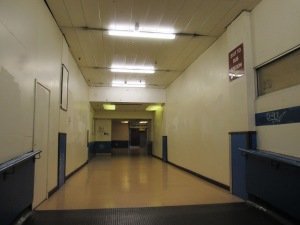




















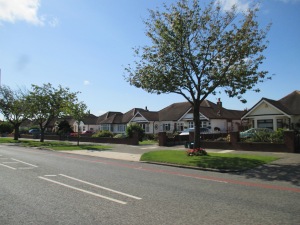











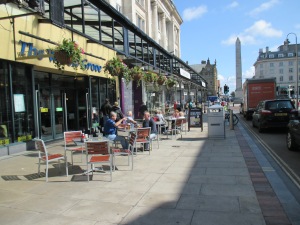















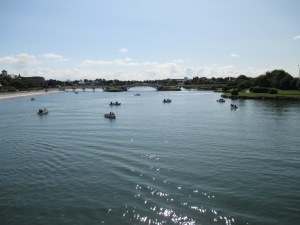

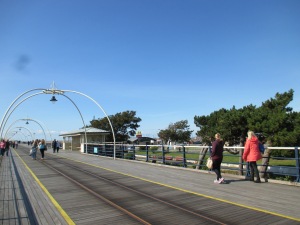
























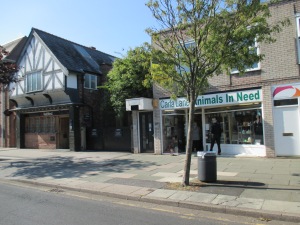











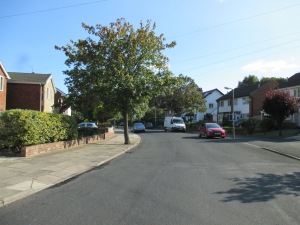






























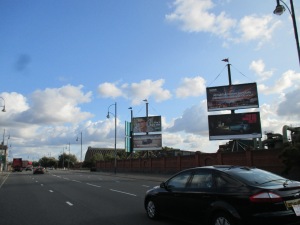













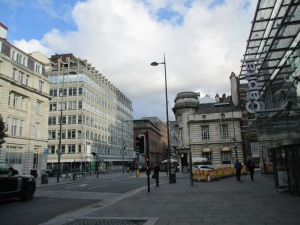



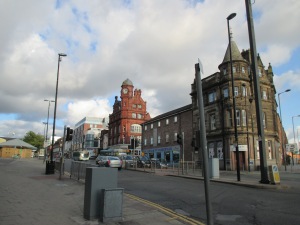
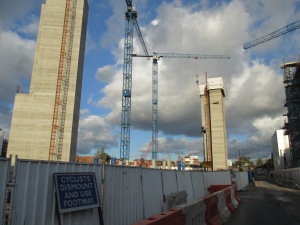




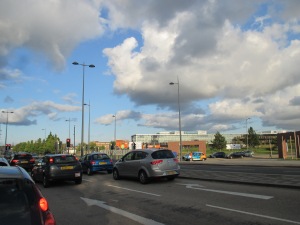












Still keeping with this and I’m finding it fascinating. Hard to believe you have been ‘on the road’ since May.